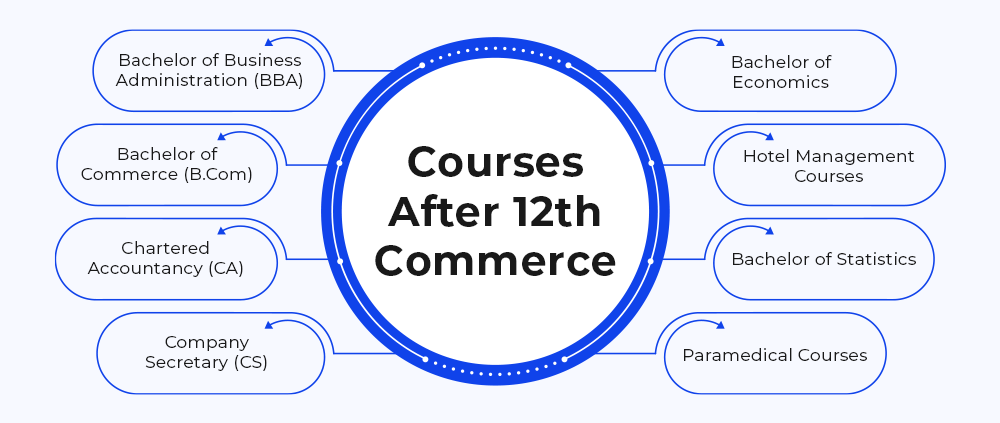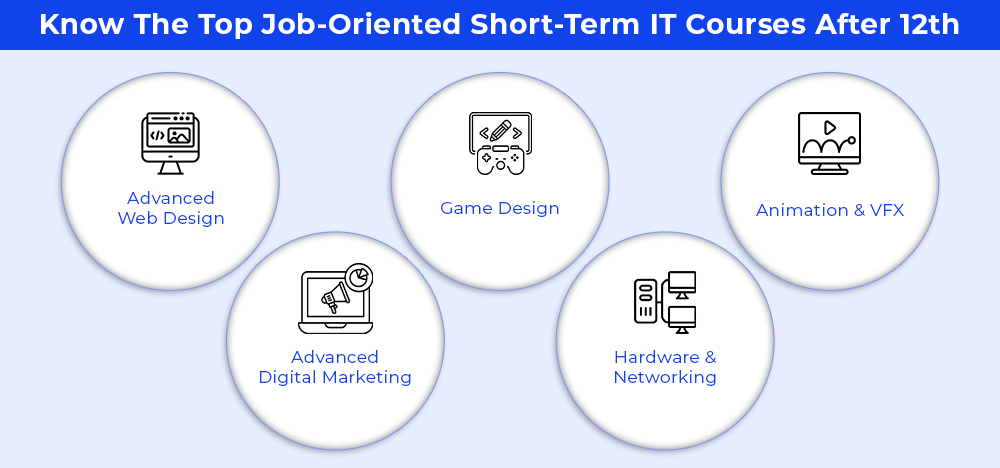What are the best job-oriented courses after 12th?!- is the most common question or frustration you could say in the minds of youngsters these days. However, not all the courses are made for everyone. Students must know about their skills as well as what the course they want to pursue demands of them.
Gone are the days of the traditional education system of 10+2+3/4. The students nowadays, or the Gen Z as they call it, are quite versatile and liberal about their career choices. It seems really absurd to them that at the young age of 18, they are meant to decide on a career that is going to affect the entire life that is ahead of them. This is why we are here to guide them about the top job-oriented courses after the 12th.
Here are the top job-oriented short-term as well as long-term courses after 12th according to the various streams- Science, Commerce, Arts, along with the monetary benefits and future scopes of each of them:
What are the streams in the 12th?
Needless to say, Science is a subject with enormous scope due to the numerous fields of education it offers. You could be a doctor, engineer, scientist, and so much more! Based on the different subjects, here are the courses that the Science stream offers:
-
PCM- (Physics, Chemistry, Mathematics)
Students who opt for Science in class 12th, with Physics, Chemistry, and Mathematics, have a vast scope of jobs immediately after completing their graduation. If you get admission to a good university or institution, then you might get placement opportunities as well. Given below is a list of job-oriented courses and their specifications that you can opt for if you had Mathematics (PCM) in the 12th.
-
PCB- (Physics, Chemistry, Biology)
The students who opt for Biology along with Physics and Chemistry in their 12th standard are those who are looking forward to a career as a doctor. However, being a doctor is not the only option that you have after studying Biology in the 12th standard. Given below is a list of job-oriented courses and their specifications that you can opt for if you had Biology (PCB) in the 12th.
-
Commerce
Studying commerce in class 12th opens doors to a plethora of opportunities for the students and helps them get jobs earlier in their careers. Based on your interest in a particular subject, you can even choose to specialise in that particular discipline. Some undergraduate courses require you to have Mathematics as a core subject along with Commerce in the 12th standard. However, many other courses do not require Maths as an eligibility requirement. Here are some of the best job-oriented courses you can pursue as a Commerce student:
-
Arts
Getting well-paid jobs after studying Arts or Humanities is one big concern among many young minds. It's funny how people still consider Science and Commerce to be the ‘elite’ streams of education. Not many people know that one of the highest-paying jobs in the world comes from an Arts and Humanities background. Here are the best job-oriented courses after 12th from the Arts and Humanities streams.
Top Job-Oriented Courses After 12th (Stream-Wise)
Here are the top Job-Oriented courses after 12th Stream-wise, so all the students can explore the list and overview details:

|
Stream |
Popular Courses |
Top Specializations |
Top Job Roles |
Average Salary (INR LPA) |
|
Science (PCM) |
|
|
|
INR 5 - 8 LPA |
|
Science (PCB) |
|
|
|
INR 3 - 15 LPA |
|
Commerce |
|
|
|
INR 5 - 9 LPA |
|
Arts & Humanities |
|
|
|
INR 3- 9 LPA |
Job-Oriented Short-term Courses After 12th
All the above-mentioned courses in this blog are long-term courses, and if done with diligence and proficiency, they guarantee you a job right after. However, after passing the 12th, students these days are looking up to vocational courses. These short-term vocational courses prepare them for a particular skill, trade, or profession. Such courses deliver practical knowledge that helps students find jobs easily, allowing them to earn early in their careers. Most of the above-mentioned courses can be done in a shorter time with the help of Diploma and Professional Certificate courses. Below are the job-oriented short-term courses available after the 12th.

|
Science |
Commerce |
Arts & Humanities |
|
|
|
Comparison: Long-Term vs Short-Term Courses After 12th
Choosing between long-term and short-term job-oriented courses depends on your career goals, budget, and time availability. Here is an overview table:
|
Criteria |
Long-Term Courses |
Short-Term Courses |
|
Duration |
2–4 years |
3 months – 1 year |
|
Examples |
BBA, BCA, B.Sc Nursing, BHM, BDes |
Digital Marketing, Tally, Graphic Design, Coding Bootcamps |
|
Cost |
Moderate to High |
Low to Moderate |
|
Depth of Knowledge |
In-depth & academic |
Focused on practical skills |
|
Career Path |
Long-term growth, postgraduate options |
Fast-track to employment or freelancing |
|
Ideal For |
Students with time & academic interest |
Students wanting a quick job or skill switch |
Note: Many students start with a short-term course and later pursue long-term degrees once they gain experience or clarity.
Top Government & Private Colleges Offering Job-Oriented Courses
Here’s a list of top government and private institutions in India offering diploma, certificate, and professional degree programs that are job-focused:
|
College Name |
Type |
Popular Job-Oriented Courses Offered |
|
NSDC Skill Training Centers (PAN India) |
Government |
Short-term vocational training in IT, retail, healthcare, logistics, etc. |
|
IGNOU (Indira Gandhi National Open University) |
Government |
Diplomas & certificates in IT, tourism, education, and library science |
|
NIFT (National Institute of Fashion Technology) |
Government |
Fashion design, textile technology, and fashion communication |
|
IHM (Institute of Hotel Management) |
Government |
Hospitality management, hotel operations, food production |
|
Polytechnic Institutes |
Government |
3-year diplomas in mechanical, civil, IT, electrical, and applied sciences |
|
Amity University Online |
Private |
UGC-approved online degrees, digital marketing, HRM, data science |
|
NIIT |
Private |
Data analytics, full stack development, cloud computing, digital transformation |
|
Jetking |
Private |
Hardware & networking, ethical hacking, system administration |
|
Arena Animation |
Private |
VFX, animation, multimedia, UI/UX, 3D design |
|
Aptech Aviation & Hospitality Academy |
Private |
Cabin crew, airport management, travel & tourism, hospitality operations |
These institutes often have strong placement support and tie-ups with industry leaders, ensuring job readiness upon course completion.
Why Choose Job-Oriented Courses After 12th?
After completing class 12th, many students face the dilemma of what to pursue next. Choosing job-oriented courses after 12th can provide a direct path to employment and financial independence. Unlike traditional academic programs, these courses are skill-based, industry-aligned, and time-efficient, preparing students for high-demand sectors like IT, healthcare, finance, digital marketing, aviation, and design.
Benefits of Job-Oriented Courses After 12th:
- Quick entry into the job market
- Practical and hands-on training
- Often requires lower investment than full degrees
- Ideal for students who want early work experience or entrepreneurship
- Helps bridge the skill gap in emerging industries like AI, cybersecurity, and e-commerce
Whether from Science, Commerce, or Arts, students can explore courses tailored to their strengths and goals.
How to Choose the Best Job-Oriented Course After 12th Based on Your Strengths?
Here are the steps you need to follow to choose a job-oriented course after 12th, based on your strengths are listed below:
Step 1: Know Your Academic Stream
- Your stream—Science, Commerce, or Arts—lays the foundation for your career path.
- Each stream opens different job-oriented course options (technical, creative, business, etc.).
Step 2: Identify Your Interests & Passion
- Ask yourself what subjects, activities, or topics you enjoy the most.
- Do you prefer problem-solving, creativity, communication, or numbers?
Step 3: Evaluate Your Core Strengths
Match your natural skills with potential career options:
- Good with tech? Go for web development, data science.
- Creative thinker? Explore graphic design, animation.
- People-person? Look at hospitality, marketing, and journalism.
- Detail-oriented?: Try finance, logistics, or healthcare.
Step 4: Take a Career Aptitude or Personality Test
- Use free career assessment tools online.
- These tests analyze your personality traits, learning style, and recommend ideal job sectors.
Step 5: Research Trending & High-Demand Careers (2026 & Beyond)
Check industry growth trends to choose future-proof fields:
- AI & Data Science
- Cybersecurity
- E-Commerce & Digital Marketing
- Renewable Energy
- Healthcare & Nursing
Step 6: Shortlist Relevant Job-Oriented Courses
- Choose short-term or long-term courses based on your preferences and goals.
- Look for programs offering certifications, hands-on training, and strong placement support.
Step 7: Consider Your Budget & Duration
- Short-term courses (3–12 months) are affordable and skill-specific.
- Long-term diploma/degree courses (1–3 years) offer deeper knowledge and broader opportunities.
Step 8: Check Placement Records & Industry Tie-Ups
- Opt for institutes that offer internships, real-world projects, or guaranteed job assistance.
Note: The best course is one that matches your strengths, fits industry needs, and fuels your passion. Take your time to explore, compare, and then decide confidently.







